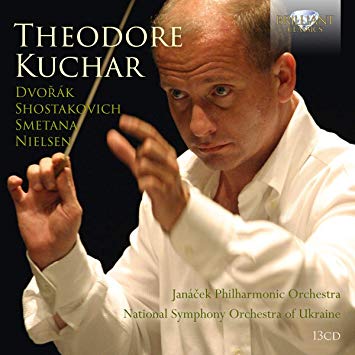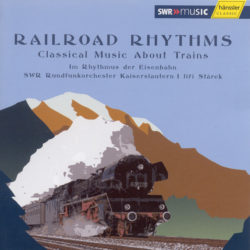Classical CD Reviews: Theodore Kuchar Collected Recordings, Eduard Strauss Centennial Edition vol. 2, and Railroad Rhythms
By Jonathan Blumhofer
Railroad Rhythms is one of the year’s delights: unexpected, well played, and thoroughly charming. Theodore Kuchar is a conductor who seems to know precious few limitations; Eduard Strauss, despite his champions, turns out to have been a competent writer of music for the day.

If you’re unfamiliar with the conductor Theodore Kuchar, perhaps that’s because his career has mainly taken him everywhere but the United States. The Ohio-born conductor has a busy international presence, as a handsome collection of his recordings with European and South American orchestras attests. The ensembles in question — the National Symphony Orchestra of Ukraine (NSO), Janáček Philharmonic Orchestra (JPO), and Orquesta Sinfónica de Venezuela (OSV) — might not be household names but they’re capable groups and, in Kuchar’s hands, well-led.
It probably shouldn’t come as a surprise that the Kiev-based NSO is a fine Shostakovich orchestra. Suffice it to say, they don’t fail to impress in the characterful performances of overtures, ballet suites, and film score excerpts Kuchar leads them in here. The selections are familiar but not overly so – the Festive Overture is on the bill, plus music from The Bolt, The Age of Gold, and The Gadfly – and they provide a nice sampling of Shostakovich’s non-symphonic efforts. Particularly welcome are vibrant readings of the Jazz Suites nos. 1 and 2 and a soaring Novorossiysk Chimes.
Equally elegant are the JPO’s accounts of music by Antonin Dvorak and Bedrich Smetana. Again, Kuchar’s repertoire choices aren’t necessarily kosher, and that’s a good thing.
He leads a rousing take on the latter’s Ma vlast, which is followed by a thorough survey of Smetana’s obscure (outside of the Czech Republic, at least) overtures, tone poems, marches, and dances. Granted, none of it – after the overture and dances from The Bartered Bride, at least – live up to the bar set by Ma vlast: pieces like Wallenstein’s Camp, Prague Festival, and the Triumphal Symphony may share many of the latter’s orchestrational gestures and larger sense of phrasing. But they generally lack its melodic fecundity and breadth of invention.
Still, the JPO digs into the music, playing it with zest.
They do the same with the Dvorak selections. Here, the recorded competition is steeper – the late tone poems, overtures (In Nature’s Realm, Carnival, and Otello), and assorted orchestral works (Symphonic Variations, A Hero’s Song, etc.) have all been well-documented – but Kuchar’s interpretations stand with the best of them, and in excellent recorded sound at that.
When the JPO casts its gaze farther afield geographically, the results are likewise pleasing, as their performances of the six Nielsen symphonies, also included here, demonstrates.
Best of all is the disc of South American fare. It’s similarly eclectic, pairing José Pablo Moncayo’s exuberant Huapango and Arturo Márquez’s sultry Danzon no. 2 with Alberto Ginastera’s Estancia Suite and Oscar Lorenzo Fernández’s Batuque (among a couple of others). All are played with visceral rhythmic energy and blazing color: Kuchar and his forces tap just a small fragment of the rich, South- and Latin American orchestral tradition here but, man, it’s an enticing sampling led by a conductor who seems to know precious few limitations.
Eduard Strauss was, in at least one respect, a typical youngest brother: he was completely overshadowed by the reputations of his older brothers, Johann Jr. and Josef. Of course, there was good reason for this. Johann’s melodic gifts as a composer, his charismatic leadership as a conductor, and his sheer prolificacy in several genres was hard to compete with. As were Josef’s refined compositional abilities.
In recent years, there’s been something of an effort to instate Eduard as a forgotten equal among his siblings and it continues with the second installment of Marco Polo’s Eduard Strauss Centenary Celebration.
The biggest problem with pushing the notion that Eduard is the neglected genius of the Strauss family is that, in truth, he wasn’t. A gifted tunesmith, yes. A fine composer of schnell polkas and galopps, indeed. But, despite fetching ideas here and there in his waltzes (Freie Gedanken and Bemooste Häupter stand out on this disc), there’s little in his music that, ultimately sticks in the memory.
On the contrary, Eduard was a competent writer of music for the day — as many good composers are — and, while there’s no harm in revisiting his music, neither does the effort yield much by way of revelation. Posterity, it seems, got the judgment right in this instance.
The performances on this disc by John Georgiadis and the Czech Chamber Philharmonic Orchestra Pardubice are lively and fresh if, at times, a bit ragged. There are moments of spotty ensemble in a few of the faster pieces (like Froh durch die ganze Welt and Flott!), though the waltzes tend to flow swimmingly.

“Classical Music About Trains” is among the more random album concepts you’d expect to come across. Yet here’s the SWR Rundfunkorchester Kaiserslautern’s collection of train-themed music that spans a little more than a century and three continents. Taped in 2005 and 2006 and conducted by Jiří Stárek, Railroad Rhythms is one of the year’s delights: unexpected, well played, and thoroughly charming.
The disc’s program is, predictably, all over the map. There’s 19th-century dance music — Hans Christian Lumbye’s Kopenhagen Eisenbahn-Dampf Galopp and Eduard Strauss’s Bahn frei! — could hardly be skipped over (nor, for that matter, could Eduard’s Mit Dampf! and Johann Strauss Jr.’s Vergnügungszug). Heitor Villa-Lobos’s “O Trenzinho do Caipira” (from the Bachianas brasileiras no. 2) and Arthur Honegger’s “Pacific 231” are here, too, as, for some reason or other, is Dvorak’s Humoreske.
The remainder of this railway-inspired fare runs from substantial essays like Vincent D’Indy’s evocative “Horizons verts – Falconara” and Hilding Rosenberg’s austere Railway-Fugue to Aaron Copland’s John Henry. A Railroad Ballad and Silvestre Revueltas’ “Construction of the Railroad.” Even Leonard Bernstein makes an appearance (with the “Subway Ride and Imaginary Coney Island” from On the Town).
Stárek and the SWR orchestra play them all with style and energy: the performances are light on their feet, filled with character and color. If you ever worried that a German orchestra mightn’t managing the sultry glow of Villa-Lobos, the élan of D’Indy, or the broad, clean lines of Copland, rest assured – the Kaiserslautern ensemble plays this music as ingratiatingly as you’re likely to hear it done.
Jonathan Blumhofer is a composer and violist who has been active in the greater Boston area since 2004. His music has received numerous awards and been performed by various ensembles, including the American Composers Orchestra, Kiev Philharmonic, Camerata Chicago, Xanthos Ensemble, and Juventas New Music Group. Since receiving his doctorate from Boston University in 2010, Jon has taught at Clark University, Worcester Polytechnic Institute, and online for the University of Phoenix, in addition to writing music criticism for the Worcester Telegram & Gazette.
Tagged: Brilliant Classics, Eduard Strauss, Marco Polo, SWR Classics, SWR Rundfunkorchester Kaiserslautern
